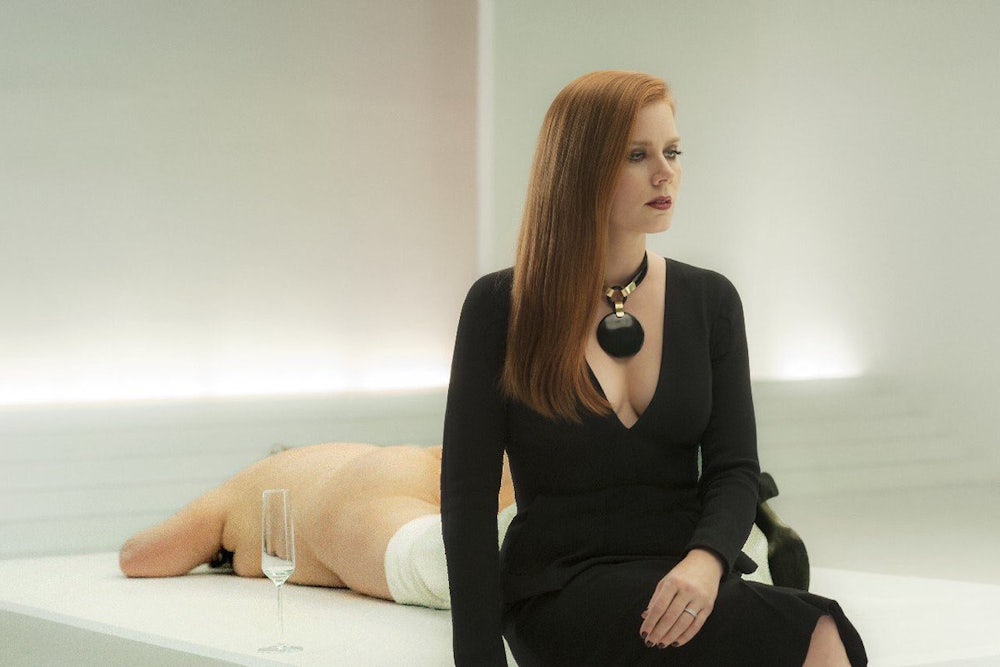Tom Ford’s Nocturnal Animals makes a lot of noise for a movie that doesn’t have much to say. With his 2009 debut A Single Man, Ford showed he could find the beating heart beneath a character’s preternaturally composed façade. In trying to expand his canvas, he loses control of his instrument. Nocturnal Animals is a film that wants to be about art, masculinity, compromise, and the frivolity of modern life, but Ford can’t quite keep all the balls in the air. There are points where the film is satirical, then sad, then outrageous, but it just never quite fits of a piece. It is, however, never dull, and it’s never not gorgeous. It’s a movie that fancies itself as being sharp and clever, but ends up oddly mushy and shapeless.
Amy Adams, who is currently everywhere you look right now, plays Susan, a rich Los Angeles socialite married to a soulless, cheating stockbroker (Armie Hammer). Susan spends her days at home, looking longingly out her perfect window in the Hollywood Hills, silently lamenting the choices that led her into this sullen existence. One day, a package arrives. It’s a manuscript dedicated to her, a novel written by her ex-husband Edward (Jake Gyllenhaal). She sits down to read and suddenly we’re in the book, as a Texan father of two (also played by Gyllenhaal) commits himself to revenge after he witnesses his wife and daughter get attacked and raped by a trio of West Texas marauders (led by Aaron Taylor-Johnson). The movie then spins out into several stories at once: The novel, Susan’s sleepwalk through life, and a flashback to the dissolution of Susan’s and Edward’s marriage.
The three stories are intertwined and meant to comment on each other, but honestly I’m not sure what Ford is trying to say. The protagonist of Edward’s novel is clearly meant as a response to Susan’s marital complaints—that he was too weak and unrealistic about the real world. (Susan’s own trouble turns out to be that she was more materialistic than her novelist husband, as her Dallas WASP mother, played in one scene by a gloriously hammy Laura Linney, had warned her.) As we dive further into novel-turned-film-within-a-film, it becomes clear the protagonist is essentially Edward, and the message he’s trying to send to Susan after nineteen years of silence is one of revenge and anger. But Ford’s stance on the material is strangely opaque: He treats the novel as pulpy melodrama with moments of piercing clarity, while leaving the real-world drama oddly vague. (There is also a brief moment when the movie briefly turns into a satire about art, which may be the only time Ford feels personally connected to the material.)
Adams’s performance is at turns sad and angry, calculating and empty. She spends the film reaching for what she thinks Ford is trying to get at, but never quite nailing it. For all her regret, it’s difficult to argue that Susan and Edward should have been together in the first place. Gyllenhaal is excellent at getting across Edward’s rage at his own perceived impotence, but the performance never quite feels real. The only actor that really nails it, as he always does, is Michael Shannon, as the novel’s Texas sheriff; he moves delicately along the knife edge of absurdity and intensity, while the the movie ends up falling off. The movie has so much posing, both behind and in front of the camera, that you can’t help but thank Shannon for showing up and tearing everything down.
There’s still plenty to admire here, from Ford’s famously meticulously constructed scenery to otherworldly exterior shots of West Texas. But this is a movie that is obsessed with feeling like it’s powerful rather than actually being powerful. With Nocturnal Animals, Ford has tried to merge the high emotions of pulp with the quiet reserve of modern art. I never got bored watching Ford try to cobble it all into a piece, but I never quite understood what compelled him to try to do so in the first place.
Grade: C+
Grierson & Leitch write about the movies regularly for the New Republic and host a podcast on film. Follow them on Twitter @griersonleitch or visit their site griersonleitch.com.
